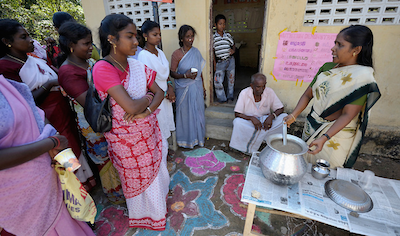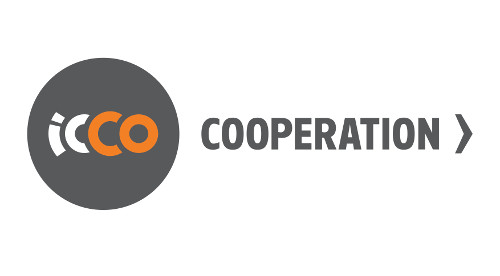Difference between revisions of "Dietary Diversity Questionnaire for Women"
(→Questions) |
(→Questions) |
||
| (3 intermediate revisions by the same user not shown) | |||
| Line 1: | Line 1: | ||
| − | [[Image:women_nutrition.png|thumb|right|200px||Source: [http://blog.worldfishcenter.org/ | + | [[Image:women_nutrition.png|thumb|right|200px||Source: [http://blog.worldfishcenter.org/ blog.worldfishcenter.org]]] |
===Instructions for Applying a Dietary Diversity Questionnaire=== | ===Instructions for Applying a Dietary Diversity Questionnaire=== | ||
| Line 52: | Line 52: | ||
| | | | ||
|} | |} | ||
| − | ::'''''* Total is the [ | + | ::'''''* Total is the [[Monitoring Nutrition - Women | Dietary Diversity Score]]''''' |
<br> | <br> | ||
| Line 98: | Line 98: | ||
| | | | ||
|} | |} | ||
| − | ::'''''* Total is the [[Monitoring Nutrition - Women Dietary Diversity Score]]''''' | + | ::'''''* Total is the [[Monitoring Nutrition - Women | Dietary Diversity Score]]''''' |
<br> | <br> | ||
| Line 158: | Line 158: | ||
| | | | ||
|} | |} | ||
| − | ::'''''* Total is the [[Monitoring Nutrition - Women Dietary Diversity Score]]''''' | + | ::'''''* Total is the [[Monitoring Nutrition - Women | Dietary Diversity Score]]''''' |
::'''Minimum Dietary Diversity Score for Women of reproductive age 15-45: the threshold is 5 food groups out of 10.''' | ::'''Minimum Dietary Diversity Score for Women of reproductive age 15-45: the threshold is 5 food groups out of 10.''' | ||
Latest revision as of 01:12, 28 October 2019

Contents
Instructions for Applying a Dietary Diversity Questionnaire
The dietary diversity questionnaire is to be applied at individual level to for example women of reproductive age. The data is to be collected through a face-to-face interview with preferably the person who is responsible for preparation of meals. She is asked to recall the foods used during the previous 24 hours (so-called 24-h recall survey). As the meals have to be ‘converted’ into food groups for registration the questionnaire should be applied by an interviewer with substantial knowledge about food and nutrition. It is important that interviewer verifies first if the ‘reference day’ for registering the foods/meals consumed can be considered as an average. He/she should check whether the meals were different due to a celebration, the weekend, illness, or other special event or circumstances. If so, an earlier ‘more average day’ should be identified for the 24-hour recall. As for the overall timing in the case of a baseline it is important to take into account duration and frequency of lean periods. The questionnaire should preferably be applied during lean period and when repeated for evaluation purposes it should be applied during the same period of the year.
Questions
During a face-to-face interview the female responsible for the meals at household level is asked:
- Did you have breakfast yesterday (or during another reference day last week)?
- 1=yes
- 2=No
- If yes please describe the foods that you ate or drank
- The interviewer should ask for which ingredients were used and register all different ingredients included in the meal (whenever the quantity is > 15 g per serving). On the spot the interviewer has to register per meal which foods have been consumed by ticking the related food group from for example the list of 11 different food groups shown below.
Food Group Register 1 if consumed
during the meal1. All starchy staple foods 2. beans and peas (including soybeans and products) 3. nuts and seeds 4. dairy 5. flesh foods (meat and fish) 6. eggs 7. Vitamin A-rich dark green leafy vegetables 8. Other vitamin A rich vegetables and fruits 9. other vegetables 10. other vegetables 11. oils and fats
- * Total is the Dietary Diversity Score
- Did you consume anything in between breakfast and lunch?
- If yes please describe the foods that you ate or drank
- The interviewer should ask for which ingredients were used and register all different ingredients included in the meal (whenever the quantity is > 15 g per serving). On the spot the interviewer has to register per meal which foods have been consumed by ticking the related food group from for example the list of 11 different food groups shown below.
Food Group Register 1 if consumed
during the indicated period1. All starchy staple foods 2. beans and peas (including soybeans and products) 3. nuts and seeds 4. dairy 5. flesh foods (meat and fish) 6. eggs 7. Vitamin A-rich dark green leafy vegetables 8. Other vitamin A rich vegetables and fruits 9. other vegetables 10. other vegetables 11. oils and fats
- * Total is the Dietary Diversity Score
- Did you have lunch?
- If yes please describe the foods that you ate or drank
- Use form, above
- Did you consume anything in between lunch and dinner?
- If yes please describe the foods that you ate or drank
- Use form, above
- Did you have dinner?
- If yes please describe the foods that you ate or drank
- Use form, above
- Did you consume anything after dinner?
- If yes please describe the foods that you ate or drank
- Use form, above
- For the calculation of the Dietary Diversity Score the frequency of consumption (as well as quantity) is not taken into consideration. In order to get the dietary diversity score per 24 hours the food groups ticked for one or more of the meals/snacks have to be added, which will result in a figure between 0 – 11, or more depending on the total number of food groups included in the survey.
Food Group Register 1 if consumed during
the indicated period of 24 hours.1. All starchy staple foods 2. beans and peas (including soybeans and products) 3. nuts and seeds 4. dairy 5. flesh foods (meat and fish) 6. eggs 7. Vitamin A-rich dark green leafy vegetables 8. Other vitamin A rich vegetables and fruits 9. other vegetables 10. other vegetables In addition, ICCO recommends the following food group
11. oils and fats
- * Total is the Dietary Diversity Score
- Minimum Dietary Diversity Score for Women of reproductive age 15-45: the threshold is 5 food groups out of 10.
Using Akvo FLOW tool for registering Dietary Diversity
ICCO has successfully used the Akvo FLOW tool for gathering and processing Dietary Diversity Data. To facilitate registering we have decided to have the interviewer tick the food groups per meal on the mobile device. This calculation can be built into the Akvo FLOW tool.

